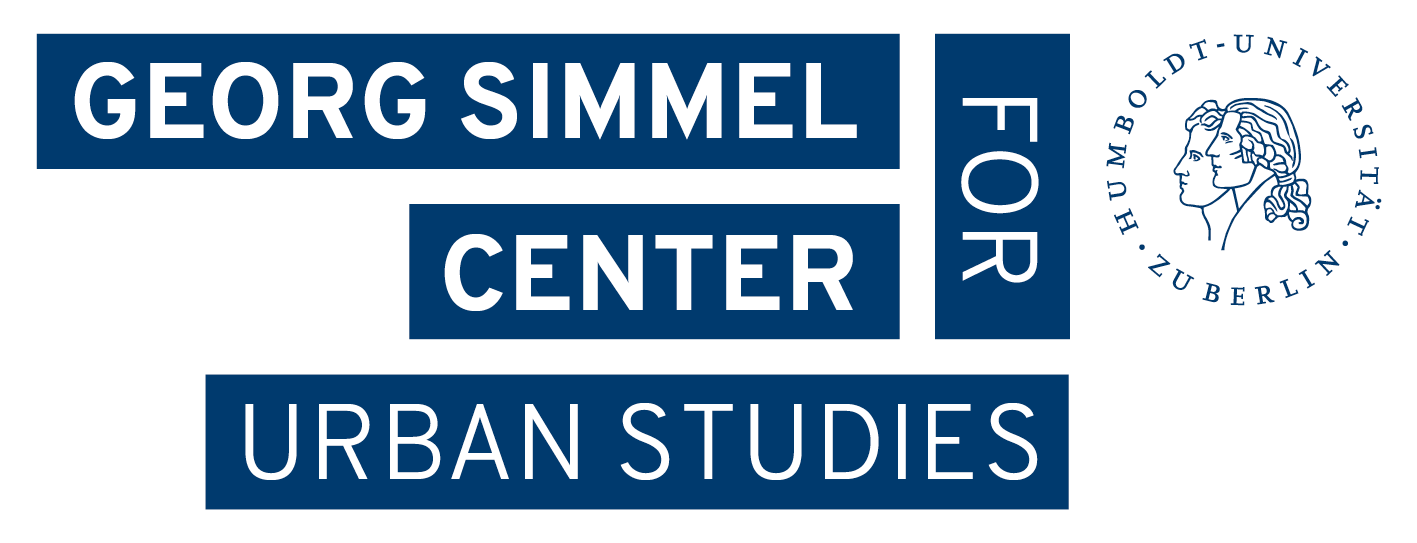Awards
The Georg Simmel Centre promotes outstanding research in the field of metropolitan studies with two prizes:
- The Hartmut-Häußermann-Price "Soziale Stadt" is awarded to authors of monographs (e.g. dissertations or post-doctoral theses) that address questions of social and cultural inclusion and exclusion in cities and the resulting challenges of urban policy design.
- The Georg-Simmel-Price for theses is awarded as part of the annual student conference. This offers young academics the opportunity to present their theses (Bachelor's, Master's, Magister) to an academic audience. The Georg Simmel Prize is awarded to the best Bachelor's and Master's/Magister thesis.
Hartmut-Häußermann-Price "Soziale Stadt"
Every two years, the Georg Simmel Centre for Metropolitan Studies at the Humboldt University of Berlin awards the Hartmut Häußermann Prize "Soziale Stadt". The prize is awarded to outstanding monographs that realise interdisciplinary, enlightened and socially oriented urban research. The prize, donated by Dr. Ruth Jacob, is endowed with 3,000 euros and is awarded every two years by the Georg Simmel Centre for Metropolitan Studies at the Humboldt University in Berlin.
Hartmut Häußermann's research stands for an urban sociology committed to social enlightenment. It examines the classic sociological questions of integration and change in society using the example of modern urban societies and focuses on both their emancipatory and destructive potentials. In Häußermann's work, the city is not only thematised as an expression and condensation of social dynamics, but also as a politically constituted object of research and an independent field of design. Häußermann has examined his central research topic, the causes, manifestations and consequences of social and cultural inequality in cities, from three perspectives: as an expression of fundamental social structures, as a result of current urban development processes and as a field of action for urban policy. For him, the Socially Integrative City was both an object of study and a goal of cognitive, urban policy action. His initiative for neighbourhood management in Berlin as a resident-centred urban policy instrument is exemplary for a science that becomes effective in concrete urban life.
At the same time, it is to Hartmut Häußermann's great credit that he has placed his enlightened and socially oriented urban research in an international research context and has established diverse international research cooperations. Häußermann's merits also include the fact that he always understood urban research as an interdisciplinary task. At the Humboldt University in Berlin, where he held the Chair of Urban and Regional Sociology from 1993 until his retirement in 2008, he was a founding member of the interdisciplinary Georg Simmel Centre for Metropolitan Studies.
Award ceremony 2021
On Friday, 5 November 2021, the Georg Simmel Centre for Metropolitan Studies awarded the Hartmut-Häußermann-Price „Soziale Stadt“. This year, two researchers shared the prize for socially oriented urban research: Dr. Nihad El-Kayed was awarded for her scientific work "Local Conditions of Democracy", while Dr. Michael Ziehl received the prize for his work "Coproduction of Urban Resilience". The awarding of the Hartmut Häußermann Prize was the crowning finale of the Georg Simmel Centre Days 2021, which were preceded by the Hartmut Häußermann Symposium and the GSZ Student Conference.
The symposium was introduced by Prof. Claire Colomb, who 
This was followed by a panel discussion with the prize winners, guest speaker Prof. Talja Blokland, laudator Prof. Martin Kronauer and the 2017 winner Dr. Christine Barwick. Based on the two works, inner-city paticipation possibilities, especially for migrant milieus, were discussed and critically questioned.
Georg-Simmel-Price
For 10 years now, the student conference has offered Bachelor's and Master's graduates the opportunity to present their thesis in a lecture and to discuss it with other academics. The participants' different disciplinary approaches to urban research topics stimulate a varied academic exchange at the conference.
Particularly outstanding papers will have the chance to be awarded the Georg Simmel Prize at the conference. This is endowed with 250€ for the best Bachelor's thesis and 500€ for the best Master's thesis.
2021
In 2021, Helene Mildenberger (r.) was awarded the Bachelor's 
The Georg Simmel Prize for the best Master's thesis went to Bastian Manteuffel (l.) and his work "From Urban to Communicational Problems? An inquiry into the problematization of digital urbanism". In his work, he critically examines the question of why the "digital city" is increasingly being considered as a goal of urban development.
2020
The Georg-Simmel-Price 2021 for the best Bachelor's thesis 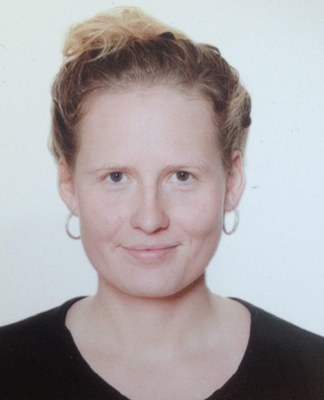 went to Leonie Thies and her work "Die (De-)Konstruktion von Glaubhaftigkeit und Glaubwürdigkeit in Asylprozessen. Eine Ethnographische Studie am Verwaltungsgericht Berlin.". With her Bachelor's thesis, she presented an extremely comprehensive ethnographic study on the construction of credibility in asylum proceedings from the perspective of the judges.
went to Leonie Thies and her work "Die (De-)Konstruktion von Glaubhaftigkeit und Glaubwürdigkeit in Asylprozessen. Eine Ethnographische Studie am Verwaltungsgericht Berlin.". With her Bachelor's thesis, she presented an extremely comprehensive ethnographic study on the construction of credibility in asylum proceedings from the perspective of the judges.
The 2021 Georg-Simmel-Price for the best Master's thesis went 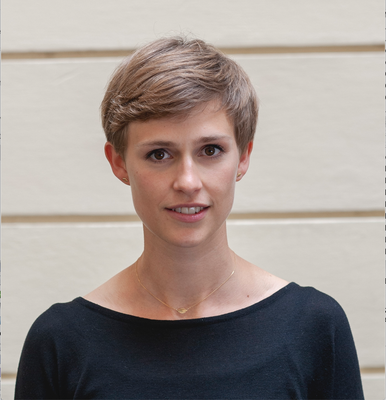 to Leoni J. Keskinkılıç and her work "Fragile Figurationen in umkämpften Nachbarschaften. Eine ethnographische Analyse von lokalen Aushandlungsprozessen um die Unterbringung von Geflüchteten in Deutschland." With her work, she produced a complex ethnographic study that comprehensively and convincingly analyses the conflicts and negotiation processes surrounding the local accommodation of refugees in two metropolitan neighbourhoods.
to Leoni J. Keskinkılıç and her work "Fragile Figurationen in umkämpften Nachbarschaften. Eine ethnographische Analyse von lokalen Aushandlungsprozessen um die Unterbringung von Geflüchteten in Deutschland." With her work, she produced a complex ethnographic study that comprehensively and convincingly analyses the conflicts and negotiation processes surrounding the local accommodation of refugees in two metropolitan neighbourhoods.
2019
The prize for the best Bachelor's thesis in 2019 was won by 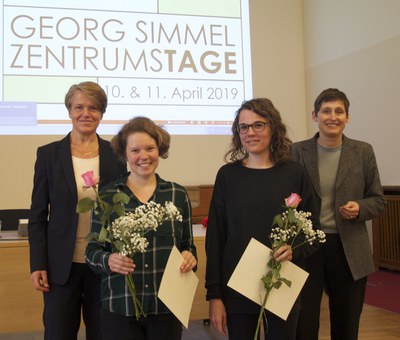 Sophia Wiedergrün (r.) with her thesis "'A praça é minha família.'- 'Der Platz ist meine Familie.' Der Franklin Roosevelt Platz als Überlebensraum für marginalisierte Bewohner*innen São Paulos, Brasilien.". In her thesis, she investigated the use practices of a public square in Sao Paulo, and how marginalised city dwellers find resources here to cope with their daily lives. The prize for the best Master's thesis went to Hannah Göppert (l.) and her work "Perception of social cohesion and online discussion culture in the local network. Explorative study in a small Saxon town". She dealt with the role of digital spaces such as online communities for the negotiation of local social cohesion. She interviewed residents in a small town in Saxony and conducted online observations in social networks.
Sophia Wiedergrün (r.) with her thesis "'A praça é minha família.'- 'Der Platz ist meine Familie.' Der Franklin Roosevelt Platz als Überlebensraum für marginalisierte Bewohner*innen São Paulos, Brasilien.". In her thesis, she investigated the use practices of a public square in Sao Paulo, and how marginalised city dwellers find resources here to cope with their daily lives. The prize for the best Master's thesis went to Hannah Göppert (l.) and her work "Perception of social cohesion and online discussion culture in the local network. Explorative study in a small Saxon town". She dealt with the role of digital spaces such as online communities for the negotiation of local social cohesion. She interviewed residents in a small town in Saxony and conducted online observations in social networks.
2018
The prize for the best bachelor thesis in 2018 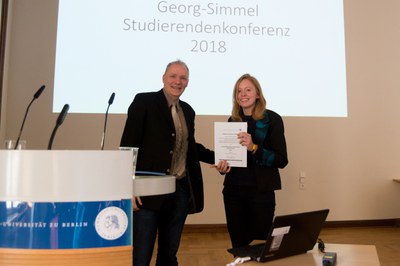 went to Stéphanie-Fabienne Lacombe and her thesis "Municipal Solid Waste Management Strategies in peri-urban areas of Dar es Salaam". In her work, she investigated waste management in the peri-urban Dar es Salaam. For this purpose, she conducted field research on site.
went to Stéphanie-Fabienne Lacombe and her thesis "Municipal Solid Waste Management Strategies in peri-urban areas of Dar es Salaam". In her work, she investigated waste management in the peri-urban Dar es Salaam. For this purpose, she conducted field research on site.
The prize for the best Master's thesis in 2019 went to 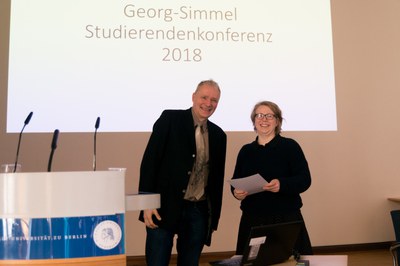 Susanna Raab and her thesis "Über den Einfluss der Eigentümer*innenstruktur auf Segregationsprozesse - Eine qualitative Analyse am Beispiel des Kosmosviertels". She looked at landlord and owner structures and resident segregation in the Kosmosviertel, in Treptow-Köpenick. Her work provides significant results on segregation in the Berlin context.
Susanna Raab and her thesis "Über den Einfluss der Eigentümer*innenstruktur auf Segregationsprozesse - Eine qualitative Analyse am Beispiel des Kosmosviertels". She looked at landlord and owner structures and resident segregation in the Kosmosviertel, in Treptow-Köpenick. Her work provides significant results on segregation in the Berlin context.
